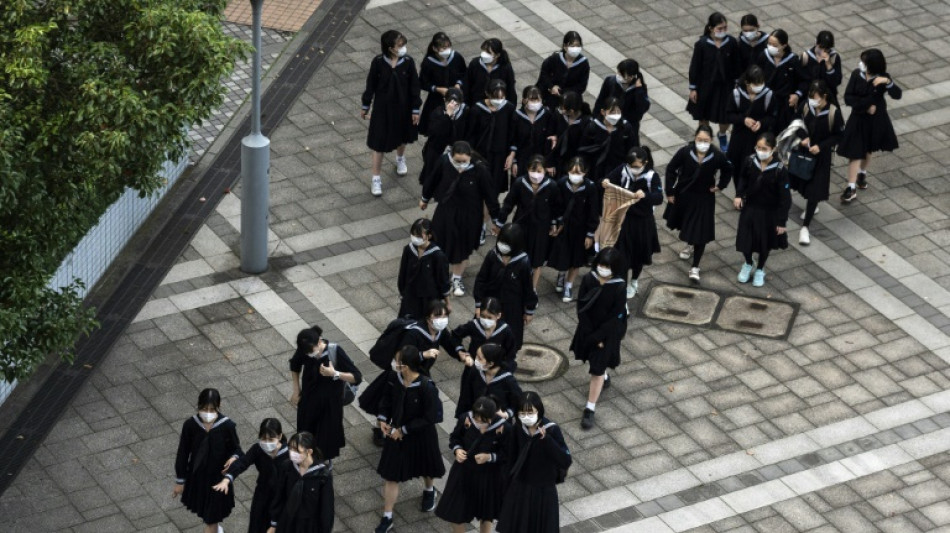
-
 Post-it maker 3M faces Belgian trial over 'forever' chemicals
Post-it maker 3M faces Belgian trial over 'forever' chemicals
-
UK comedian Russell Brand pleads not guilty to new rape, assault charges

-
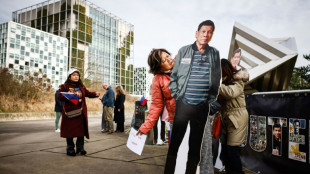 Duterte drew up 'death lists', boasted about murders: ICC prosecutor
Duterte drew up 'death lists', boasted about murders: ICC prosecutor
-
UK govt urged to release documents linked to ex-prince Andrew
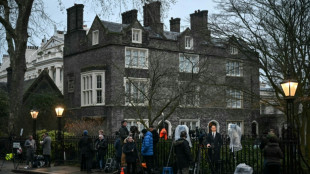
-
 Rights group slams treatment of viral Japanese monkey
Rights group slams treatment of viral Japanese monkey
-
Inside the bunker where Zelensky led response to Russian invasion

-
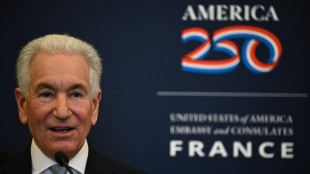 France demands explanation from US envoy over 'surprise' no-show
France demands explanation from US envoy over 'surprise' no-show
-
Putin failed to achieve goals in Ukraine, Zelensky says on war anniversary

-
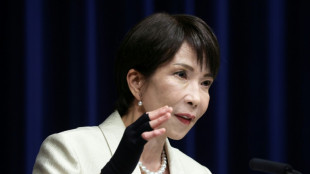 China tightens Japanese trade restrictions as spat worsens
China tightens Japanese trade restrictions as spat worsens
-
Ukraine war exhibition opens at Berlin Nazi bunker museum

-
 Jihadist threat puts eastern Senegal on edge
Jihadist threat puts eastern Senegal on edge
-
Kim Yo Jong: the powerful sister behind North Korea's supreme leader
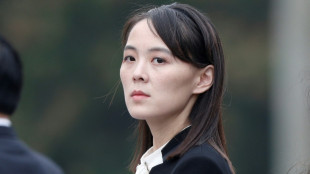
-
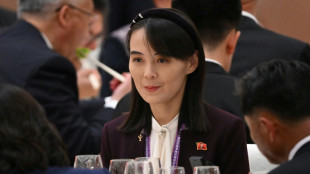 North Korea ruling party promotes Kim Jong Un's younger sister
North Korea ruling party promotes Kim Jong Un's younger sister
-
Mexico's Jalisco cautiously tries returning to normal after cartel violence

-
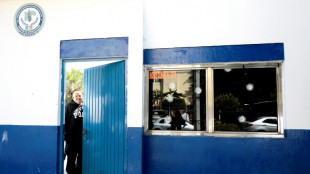 Mexico's violence-hit Guadalajara to host World Cup games
Mexico's violence-hit Guadalajara to host World Cup games
-
Mourinho's Bernabeu homecoming upended by suspension, racism row

-
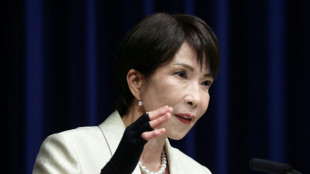 China targets Japanese companies over military ties
China targets Japanese companies over military ties
-
Griezmann in talks to join MLS side Orlando City: source

-
 France to revoke US envoy's govt access after summons no-show
France to revoke US envoy's govt access after summons no-show
-
Spurs overpower Pistons in clash of NBA's form teams

-
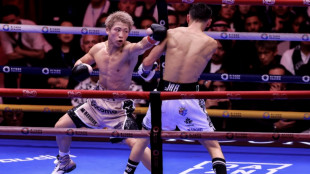 Inoue to fight Nakatani in Tokyo in May: reports
Inoue to fight Nakatani in Tokyo in May: reports
-
Canada PM to push trade, rebuild fractured ties in India trip

-
 Asian markets mixed as traders weigh AI and tariffs outlook
Asian markets mixed as traders weigh AI and tariffs outlook
-
Votes may 'melt like snow': Reform, Greens eye Labour UK bastion

-
 Venezuela says exiles welcome to return following mass amnesty
Venezuela says exiles welcome to return following mass amnesty
-
Australia buys parts for future AUKUS sub reactor

-
 Ukraine marks four years since Russian invasion
Ukraine marks four years since Russian invasion
-
Brazil court to try politicians over hit on black councilwoman

-
 Interim president says Venezuelans welcome to return after amnesty law
Interim president says Venezuelans welcome to return after amnesty law
-
Man kills police officer in Moscow train station blast

-
 Despite drop in 2025, Russian oil exports exceed pre-war volumes: report
Despite drop in 2025, Russian oil exports exceed pre-war volumes: report
-
Simulab Launches TraumaMan(R) System Ultrasound Module for Realistic Trauma Training

-
 Bytek Joins the Google Cloud Ready - BigQuery Program
Bytek Joins the Google Cloud Ready - BigQuery Program
-
Formation Metals Intersects 0.95 g/t Au over 61.1 Metres, including 1.68 g/t Au over 26.5 Metres at the Advanced N2 Gold Project; Bulk-Tonnage Gold Target Identified with 8 Kilometres of Strike to Explore

-
 Bolt Metals Announces Closing of Fully Subscribed Private Placement
Bolt Metals Announces Closing of Fully Subscribed Private Placement
-
InterContinental Hotels Group PLC Announces Transaction in Own Shares - February 24

-
 Nikon Expands Popular Monarch and Prostaff Binocular Lines
Nikon Expands Popular Monarch and Prostaff Binocular Lines
-
Australian PM seeks removal of UK's Andrew from line of succession

-
 Carrick hails 'ruthless' Man Utd match-winner Sesko
Carrick hails 'ruthless' Man Utd match-winner Sesko
-
N.Korea leader's sister promoted at party congress
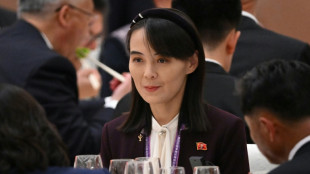
-
 The key to taking down Mexico's most-wanted narco? His girlfriend
The key to taking down Mexico's most-wanted narco? His girlfriend
-
Winter storm blankets US northeast as travel bans imposed

-
 Super-sub Sesko fires Man Utd to win at Everton
Super-sub Sesko fires Man Utd to win at Everton
-
YouTube exec says goal was viewer value not addiction

-
 Panama wrests control of canal ports from Hong Kong group
Panama wrests control of canal ports from Hong Kong group
-
Trump denies top US officer warned of Iran strike risks

-
 Mayweather to fight Pacquiao in Las Vegas in September
Mayweather to fight Pacquiao in Las Vegas in September
-
US stocks tumble on tariff fog, worries over AI

-
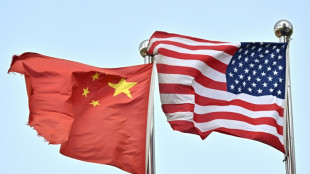 US says China 'massively expanded' nuclear arsenal
US says China 'massively expanded' nuclear arsenal
-
US forces to complete withdrawal from Syria within a month


Black hair, white shoelaces: Japan school rules under fire
Every school has its rules, but tough regulations at some Japanese institutions, mandating everything from black hair to white shoelaces, are facing increasing criticism and even legal action.
Toshiyuki Kusumoto, a father of two in western Japan's Oita, is seeking court intervention to protect his younger son from regulations he calls "unreasonable".
They include rules on hair length, a ban on styles including ponytails and braids, prohibition of low-cut socks and a stipulation that shoelaces be white.
"These kinds of school rules go against respect for individual freedom and human rights, which are guaranteed by the constitution," Kusumoto told AFP.
Later this month, he will enter court-mediated arbitration with the school and city, hoping authorities will revise the rules.
Change is already under way in Tokyo, which recently announced that strict rules on issues such as hair colour will be scrapped at public schools in the capital from April.
But elsewhere, the rules are fairly common and Kusumoto, who recalls chafing at similar restrictions as a child, hopes his legal action will bring broader change.
"It's not only about our children. There are many other children across Japan who are suffering because of unreasonable rules," he said.
Such regulations, which generally come into force when children enter middle school at around age 12, emerged after the 1970s, according to Takashi Otsu, an associate professor of education at Mukogawa Women's University.
- Rules 'destroyed a student's life' -
At the time, "violence against teachers became a social problem, with schools trying to control the situation through rules", he told AFP.
"Some kinds of rules are necessary for any organisation, including schools, but decisions on them should be made with transparency and ideally involving students, which would allow children to learn democratic decision-making," he said.
The array of regulations has been defended as helping ensure order and unity in the classroom, but there have been other challenges.
In 2017, an 18-year-old high-school girl who was repeatedly ordered to dye her naturally brown hair black filed a lawsuit in Osaka seeking compensation of 2.2 million yen ($19,130) for psychological suffering.
The case made national headlines and eventually led to the government last year instructing education boards to examine whether school rules reflect "realities around students".
But in a sign of the difficult debate over the subject, both Osaka's district and appeals courts ruled schools could require students to dye their hair black within their discretion for "various educational" purposes.
The student said she was regularly harassed over the issue even though she was colouring her hair to meet the requirements, according to her lawyer.
"This rule destroyed a student's life," he told AFP, speaking on condition of anonymity to protect his client's identity.
The student, now 22, has not given up though, and in November appealed to the supreme court.
- 'Recipe for unthinking children' -
There are other signs of pressure to change the rules, including a petition submitted to the education ministry in January by teen members of rights group Voice Up Japan.
They want the ministry to encourage schools to work with students on discussing rule changes.
"We started this campaign because some of our members have had unpleasant experiences with school rules," said 16-year-old Hatsune Sawada, a member of Voice Up Japan's high-school division.
The petition gives the example of a girl who was humiliated by a teacher for growing a fringe that, when flattened with a hand, covered the girl's eyebrows -- a violation of the rules.
In Oita, the rules also include school uniforms designated by gender, with trousers only for boys and skirts for girls.
The local education board says the rules "not only nurture a sense of unity among children but also ease the economic burden for families of buying clothes".
But Kusumoto disagrees.
"A sense of unity is not something that is imposed, it's something that should be generated spontaneously," he said.
Imposing these kinds of rules "is a recipe for producing children who stop thinking".
P.Santos--AMWN



